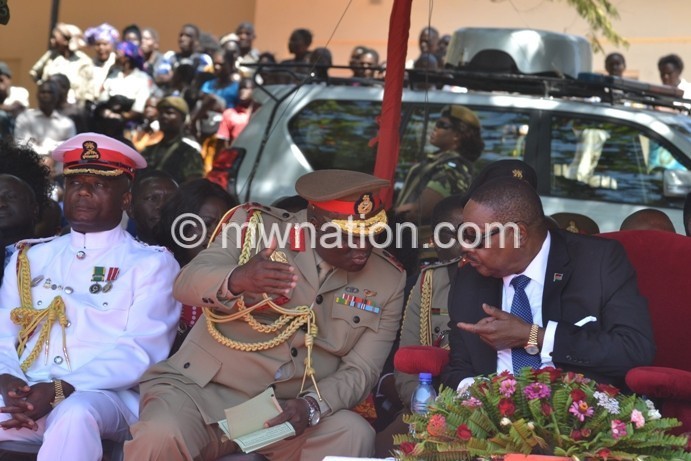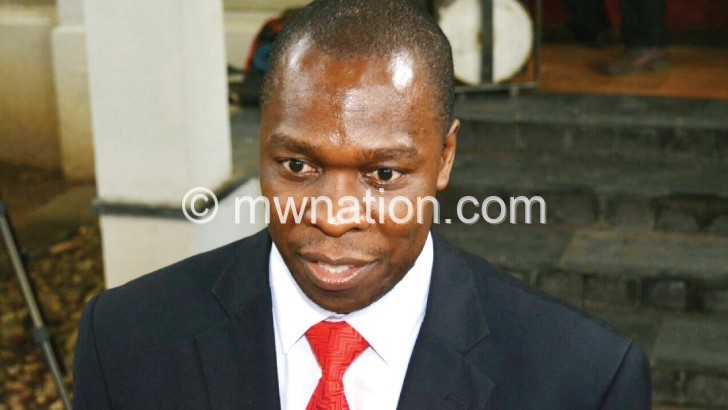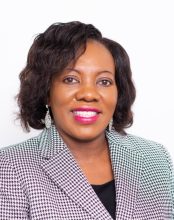Stop demos, APM orders
President Peter Mutharika has ordered the Malawi Defence Force (MDF) and Malawi Police Service (MPS) to equip themselves to the teeth to help stop Human Rights Defenders Coalition’s (HRDC) five-day demonstrations targeting the country’s borders and airports.
But HRDC and legal experts have cautioned Mutharika on the remarks, stating demonstrations are a constitutional right and that doing so would amount to contempt of court as a similar case is still in court.

The President made the order at Maritime Forces in Monkey-Bay, Mangochi on Wednesday when he commissioned military vessels procured to beef up the country’s security.
Mutharika, who has kept mum on the demonstrations despite calls from HRDC for him to address the nation on the same, accused opposition Malawi Congress Party (MCP) leader Lazarus Chakwera and his UTM Party compatriot Saulos Chilima of attempting to take over the government unlawfully by supporting the HRDC demonstrations.
He said: “As President of this country and Commander-in-Chief of the Malawi Defence Force, one of my fundamental responsibilities is to safeguard the territorial integrity and political independence of our beloved country. Without borders there is no Malawi.

“I am, therefore, directing the police and army to stop those demonstrations. Should HRDC and MCP and UTM supporters insist on invading our airports and borders, they should not say they were not warned.”
Mutharika said previous demonstrations the HRDC have conducted to force Malawi Electoral Commission (MEC) chairperson Jane Ansah to resign for allegedly presiding over flawed elections have been unlawful as they were marred with looting and attacks on people.
Said the President: “Demonstrations are a [constitutional] right but what we are seeing is thievery and burning of infrastructure, including government properties. This is the sole reason we are not entertaining the demos.”
Mutharika said peace is one of the country ‘s precious assets which needs to be jealously guarded. He also condemned the attack on a female police officer who was undressed during the previous demonstrations, saying it is immoral and unethical.
Reacting to Mutharika’s warning, HRDC deputy chairperson Gift Trapence said the President is not above the law.
He said: “If he wants to declare a State of emergency, let him follow the due process but the President is not above the law. HRDC will not sit down and watch people’s rights being curtailed. We will seek legal redress to such decrees and impunity until Jane Ansah resigns.”
Two weeks ago, HRDC demanded Mutharika to address the nation on steps he is taking to solve the current political impasse or risk triggering a high level of demonstrations.
HRDC is pushing the Mutharika administration to fire Ansah following failed attempts to force her to resign which culminated into a series of demonstrations, some of which were marred by violence and looting.
Meanwhile, human rights lawyer Justin Dzonzi has warned that Mutharika’s order is illegal.
He argued in an interview that Mutharika would be in contempt of court since the High Court already made a ruling on the matter and there is an appeal on demonstrations.
He said: “The order by the President directing police and the army to prevent the demonstrations is illegal. This is an issue which was ably dealt with by the court.
“In this country, there is a Constitution which guarantees the freedom of expression which includes the right to demonstrate. Not the President, not the Army, nor the police have the power to override the Constitution.
“At this stage, if the President was making those statements and in view of an outright court order, then he is basically being in contempt of court. I am aware of his immunities, but the Constitution explicitly states that notwithstanding his immunities, the President shall be bound by the decisions of the court. So, he cannot become a law himself.”
Dzonzi, however, cautioned that the right to demonstrate is not a licence to commit crimes such as looting and attacking people.
Another private practice lawyer William Chiwaya said Mutharika should have been mindful that former President Bakili Muluzi made a similar order in 2002, but the courts dismissed it.
He said: “As it has been held before by our courts, the President does not have powers to ban demonstrations for whatever reason. After all the issues are already in court and the President could have waited for the court to determine on the pending applications before the court.”
In a 2002 case where Malawi Law Society, Episcopal Conference of Malawi and Malawi Council of Churches were applicants against the State and the President, Minister of Home Affairs, Inspector General of Police and Army Commander, then High Court Judge Edward Twea, now Justice of Malawi Supreme Court of Appeal, ruled against the blanket banning of demonstrations against Muluzi’s bid for a third term of office.
He said: “It should be noted that the police have powers to regulate assemblies, meeting and processions… The State has numerous other laws that regulate assemblies and prevent rioting, and also laws on defamation that regulate freedom of speech and expression. The Police Service would be advised to use these powers properly.
“Again, as Malawians, the organisers of demonstrations on this issue, or indeed any other issue, for or against must bear in mind public tranquility. Democracy will always have enemies both within and without the government. There is need to strike a balance between the needs of society as a whole and those of individuals…”
He further warned against using matters of national security as an excuse for frustrating the will of the people expressed in their Constitution.
Commenting on the matter, University of Malawi’s political scientist Mustafa Hussein said there is need for dialogue because the country has gone past the stage of forcing or directing things. He said Malawi is in a democracy where citizen participation is important in the governance set-up.
His counterpart, a Lilongwe- based political scientist Godfrey Pumbwa echoed Hussein’s sentiments saying dialogue is paramount in a democratic State like Malawi.
So far, ongoing attempts for dialogue by the Public Affairs Committee (PAC) special dialogue team led by Archbishop Thomas Msusa and another one by former president Bakili Muluzi are yet to bear tangible results.
Speaking after commissioning six warships, two of which have been named after Mutharika and former president Bakili Muluzi, dubbed Ship of the Malawi Republic (SMR) Mutharika and SMR Muluzi, the President said they will help to beef up the security of the country.
The other four warships are SMRs Yohane, Maulana, Khanga and Chigawa.
Additional reporting by Joseph Mwale and Ayamba Kandodo





